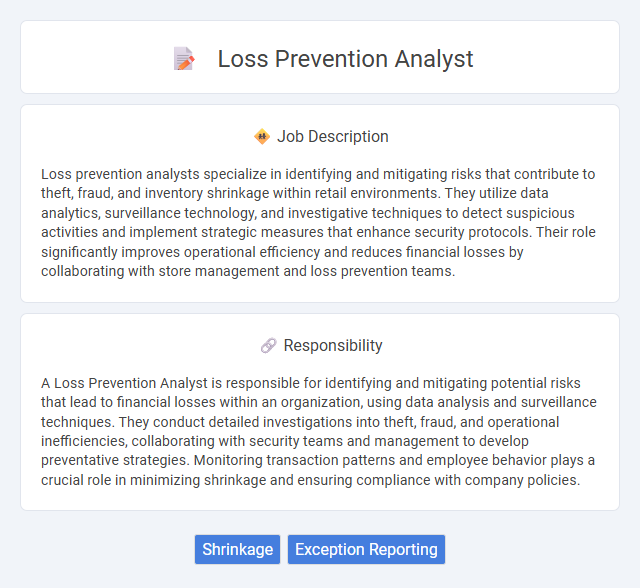
Loss prevention analysts specialize in identifying and mitigating risks that contribute to theft, fraud, and inventory shrinkage within retail environments. They utilize data analytics, surveillance technology, and investigative techniques to detect suspicious activities and implement strategic measures that enhance security protocols. Their role significantly improves operational efficiency and reduces financial losses by collaborating with store management and loss prevention teams.
Individuals with strong analytical skills and a keen attention to detail are likely well-suited for a Loss Prevention Analyst role. Those who are comfortable working with data, identifying patterns, and investigating irregularities may find this job engaging and fitting for their abilities. Conversely, people who struggle with critical thinking or prefer routine tasks without problem-solving components might find this position challenging or less suitable.
Qualification
A Loss Prevention Analyst typically requires a bachelor's degree in criminal justice, business, or a related field, along with experience in risk management or retail security. Proficiency in data analysis tools, strong investigative skills, and knowledge of security systems are essential qualifications. Certifications such as Certified Fraud Examiner (CFE) or Loss Prevention Certified (LPC) enhance a candidate's expertise and career prospects.
Responsibility
A Loss Prevention Analyst is responsible for identifying and mitigating potential risks that lead to financial losses within an organization, using data analysis and surveillance techniques. They conduct detailed investigations into theft, fraud, and operational inefficiencies, collaborating with security teams and management to develop preventative strategies. Monitoring transaction patterns and employee behavior plays a crucial role in minimizing shrinkage and ensuring compliance with company policies.
Benefit
A Loss Prevention Analyst likely enhances company profitability by identifying and mitigating risks related to theft, fraud, and operational inefficiencies. Their efforts probably lead to reduced financial losses and improved asset protection through data-driven strategies and regular audits. Employing such a professional may increase overall organizational security and support compliance with regulatory standards.
Challenge
A Loss Prevention Analyst likely faces the challenge of identifying subtle patterns of theft and fraud within complex data sets, which demands strong analytical skills and attention to detail. The role probably requires adapting to evolving security threats and maintaining up-to-date knowledge of prevention technologies. Effectively balancing investigative work with collaboration across departments may also present ongoing challenges.
Career Advancement
A Loss Prevention Analyst plays a critical role in identifying and mitigating risks that impact an organization's profitability and safety. Mastery in data analysis, risk assessment, and security technologies paves the way for career advancement into senior roles such as Loss Prevention Manager or Security Director. Gaining certifications like Certified Protection Professional (CPP) and developing expertise in forensic investigations significantly enhance promotion prospects and leadership opportunities.
Key Terms
Shrinkage
Loss prevention analysts specialize in identifying, analyzing, and mitigating shrinkage within retail or supply chain environments. They utilize data analytics, surveillance systems, and inventory audits to detect patterns of theft, fraud, and operational inefficiencies causing shrinkage. Implementing targeted strategies reduces financial losses and improves overall asset protection for businesses.
Exception Reporting
Loss prevention analysts specialize in monitoring exception reporting to identify unusual transactions and patterns that may indicate fraud, theft, or operational errors. They utilize advanced data analytics tools to scrutinize discrepancies in sales, inventory, and cash handling, enabling proactive mitigation of financial risks. Effective exception reporting facilitates timely investigations and enhances overall asset protection strategies within retail and corporate environments.
 kuljobs.com
kuljobs.com